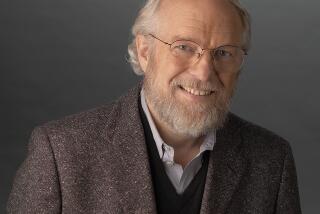The Cutting Edge: Computing / Technology / Innovation : Inventor Wants His Name Digitally Recorded in History : Law: Culver City man files suit to gain recognition for his work on optical discs. Electronics giant Philips seeks dismissal.
- Share via
A quarter of a century ago, when audio buffs were still fawning over vinyl and videocassettes were but a twinkle in a movie mogul’s eye, David Gregg left his engineering job to work on a futuristic vision: a plastic disc that could hold both sound and video, to be read not by a needle or a magnet, but by a beam of light.
Gregg--who later won four key patents to the optical disc technology that underlies compact discs, laser discs and CD-ROMs--says he has never been recognized for his work. Now the 71-year-old inventor has filed a $250-million lawsuit in U.S District Court in Los Angeles accusing consumer electronics giant Philips Electronics and its advertising agency of stealing credit for his invention.
Over the last decade, various forms of the shiny discs have resulted in billions of dollars in sales for consumer electronics firms, foremost among them Philips, which has long claimed to be the key innovator in optical technology. The firm--which last week filed a motion to dismiss the case--itself owns more than a dozen patents related to optical discs.
Gregg long ago sold the rights to his patents to MCA (for all of $50,000). And he acknowledges Philips’ contributions to the optical medium. But he insists that the Dutch firm has deprived him of the reputation he deserves as the father of a technology that has become part of daily life for millions of people--and he aims to reclaim it.
“They are a Goliath,” says Gregg, the son of a film industry engineer who still works out of the same Culver City house where he grew up. “But you know my name. And you know who won that fight.”
The lawsuit is not the first to question who owns what and why in the area of optical discs. The Justice Department is currently investigating how Philips and Sony Corp. came to dominate the compact disc business by cross-licensing each other’s patents and jointly charging licensing fees to other firms.
And nearly every major consumer electronics company is now racing to develop a high-density video disc, which would hold a whole movie, cost many times less than the current 11-inch laser disc and potentially replace the videotape.
The claim of the individual inventor against the force of big multinational entities has not always gone unrewarded. A few years ago, for example, inventor Gilbert Hyatt proved to the satisfaction of the U.S. Patent Office that he had invented the microprocessor before Texas Instruments Inc. and Intel Corp.--and began collecting millions in royalties.
What is different about Gregg’s case is that the patents themselves are not in dispute. The engineer is seeking something else: recognition--and $250 million for having been denied it. But recognition of the kind he wants may not compute with the legal system.
According to Philips’ motion, “what makes this claim wholly frivolous is Gregg’s concession that he has no interest in the patents that he allegedly invented decades ago. Instead, Gregg now seeks to protect an interest in the self-proclaimed honorific ‘title’ of ‘inventor’--an interest wholly irrelevant to the common law.”
Retorts Gregg’s attorney, David Steiner: “That’s a misapplication of the law. What we’re talking about is the attribution of inventor, just as Alexander Graham Bell is known as the inventor of the telephone. There’s major value in being known as the inventor of the optical disc. CDs are a big deal. Just ask Philips--they certainly sell enough of them.”
Gregg, proudly displaying for a visitor the different sizes and formats his original invention has taken over the years--he has collected hundreds of movies on laser disc, in addition to music CDs, mini-discs and CD-ROMs--says the claims by Philips have distressed him for years.
He has made a habit of approaching Philips representatives at the engineering conventions he still attends, copies of his patents in hand, to urge them to bring his concerns back to the firm’s headquarters in the Netherlands.
“I look through the registry and I march right up to them, and I tell them, ‘I am the sole inventor of the optical disc. Don’t you use the word inventor ,’ ” he says. “I’m just an engineer. I’m not going to get an invitation to Eindhoven.”
Philips, Gregg says, was interested in his invention--funded by seed money from General Electric--back in 1967, when he demonstrated it for Philips Phonograph Industries President J.L. Ooms. But he never heard back from the firm, and in 1968 MCA bought a controlling interest in his Westwood-based start-up firm, thus winning the rights to the patents.
“Lew Wasserman shook my hand, looked me straight in the eye and said, ‘I have 4,000 movies to put on those discs, and they can’t be pirated,’ ” Gregg remembers. MCA later formed a subsidiary, Irvine-based Discovision, to exploit the technology. Since 1974, Philips and other optical disc manufacturers have licensed the patents from Discovision.
The final straw for Gregg came when his son sent him a videotape of a 30-minute Philips infomercial, which touted the firm as a pioneer of CD technology.
With CD technology now so widespread, and Philips’ inventor claims spreading beyond engineering circles and into a mass audience, Gregg’s agitation increased. He was also seeking funding for a new venture--and he wanted the credibility that would be associated with being known as the inventor of the CD.
With his final patent--applied for decades ago but finally awarded in 1990--in his pocket, he approached a law firm late last year.
“I am the inventor of the optical disc,” he says. “They can’t rob me of that. I simply want credit where credit is due.”






